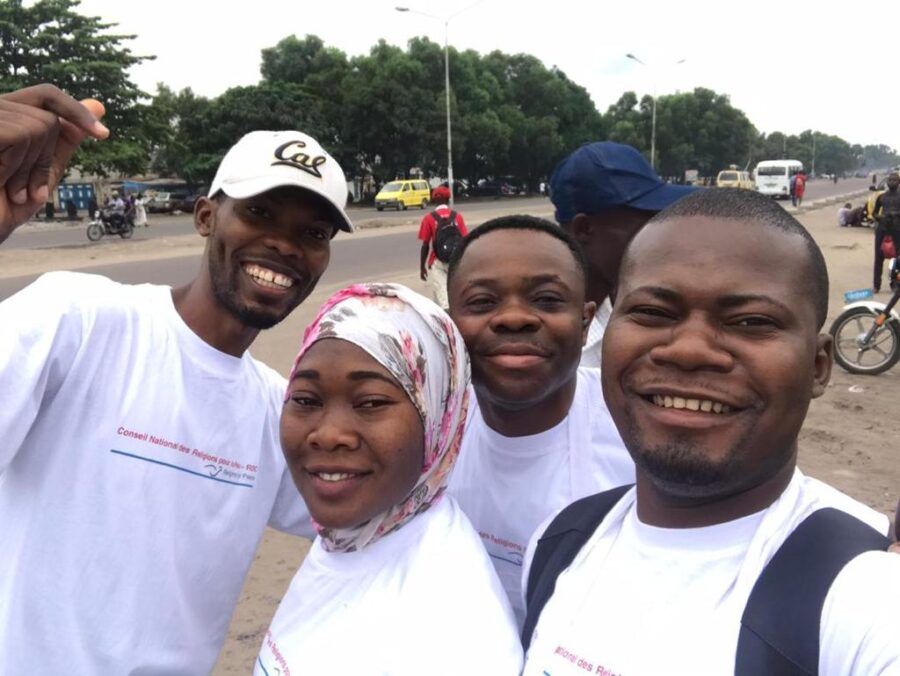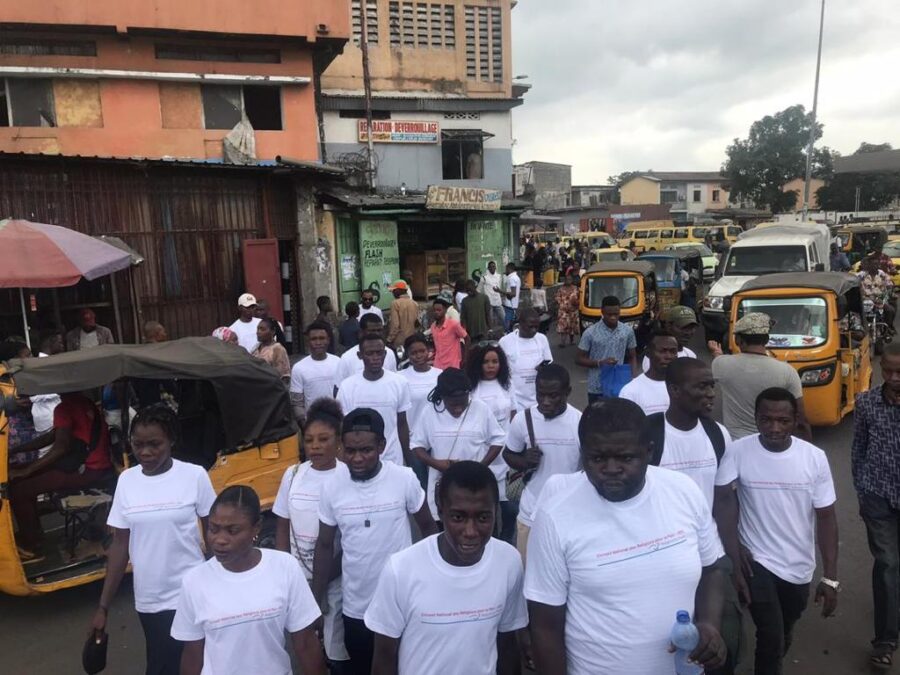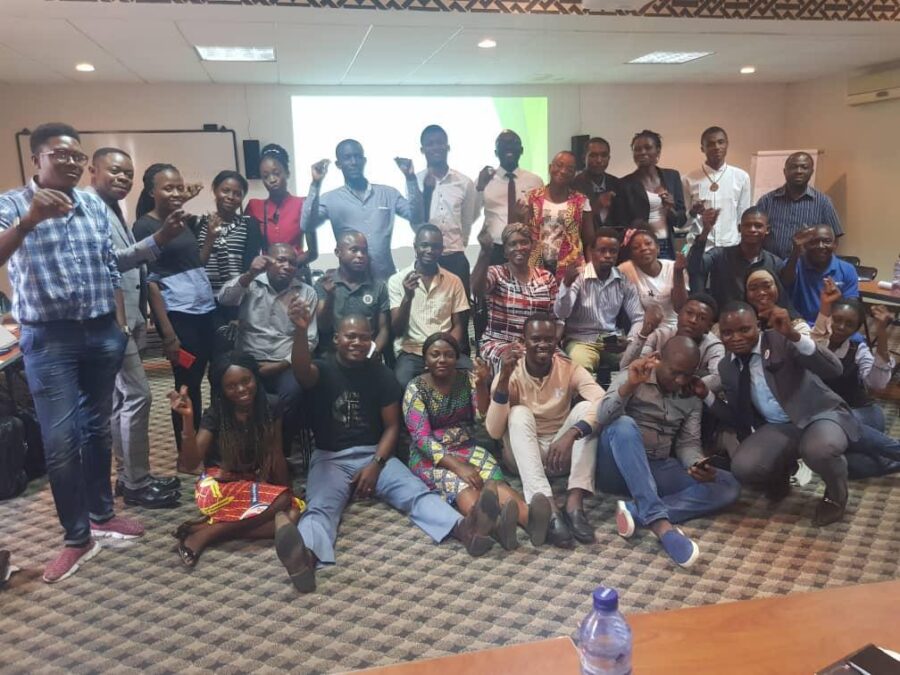Religions for Peace Youth Media Team Interviews Mr. Christian Kazadi Lupemba about the Manresa 2022 Forum
One on One: Religious Youth Leaders Inspiring Local Change, for Global Impact
As part of promoting experiential learning exchange from among its diverse global networks, especially from among some of the Religions for Peace’s vibrant global youth leaders community, the below interviews were conducted by Mr. Philbert Aganyo in a bid to highlight the climate crisis and community resilience from the lenses of select youth leaders, and to learn from what these young people are doing to solve environmental issues and promote just and sustainable cities.
Christian Lupemba is a member of the International Youth Committee of Religions for Peace, Member of the African Interfaith Youth Network of the African Council of Religious Leaders. He is also the Chairperson of the DRC Inter-Religious Youth Network of the National Council of Religions for Peace in the DRC and Member of the Office of External Affairs of the Baha’i Community in the DRC.
PHILBERT: Can you tell us about your interfaith climate work?
CHRISTIAN: Our Interfaith work on the climate consists essentially of engaging young people through capacity building and involving the organisation in clean-up activities and sensitisation of the population on the benefits of keeping our environment clean. At a higher level, we are involved in the Interfaith Rainforest Initiative where we work together with other religious leaders to influence the actions of governments and the mindsets of populations towards the protection of the environment in general, and the Congo forest in particular.
PHILBERT: Do you believe in a Multi-Religious solution to the current Climate Crisis?
CHRISTIAN: In the climate crisis as in many other challenges facing humanity, I believe that interfaith action can be an effective contribution to finding sustainable solutions. In fact, religion is the most powerful organisation in the world and its influence in today’s society is unquestionable.
It can change an individual as well as a group of people, and since people obey its authority in good faith, it can be a powerful force for behavioral change to complement some of the coercive rules set by policy makers.
PHILBERT: Being a delegate at the upcoming Climate Conference in Manresa, Catalonia in Spain, could you kindly share some of the lessons and experiences that you are bringing with you to Spain?
CHRISTIAN: As an actor to promote environmental protection, I am going to Manresa to share what we have learned through our action and also to learn from the experience of others so that together we form a strong coalition that adds its voice and above all its actions to the different initiatives in favour of sustainable development and the protection of future generations.

PHILBERT: Do you have any personal expectations of the Manresa Conference?
CHRISTIAN: It is my hope that this conference will be an opportunity for concrete solutions to be found to the real problems of climate change such as housing, food security and education, especially for young people and women.
PHILBERT: When people think of leadership, they often wish for leaders to be “experienced.” What are your thoughts: Is experience that important to leadership or are there other factors that could also make a leader good, especially in climate related matters?
CHRISTIAN: First of all, I think that experience is a crucial element in establishing visionary leadership, but it is not the only one. Leadership, as well as experience, is not acquired by a magic wand. Leaders are built through action, commitment, dedication and above all, through a learning process that allows learning and forward motion, while one is engaged in action – and I know of many young people who have demonstrated these qualities.
So we see young people who, although are not experienced enough, have this capacity to engage in action and manage to make a significant difference, especially on the issue of climate change.
PHILBERT: The young generations are raising their voice right now. There is a global movement on environmental matters and their voices are being heard. But do you think, being loud and being heard is enough? What in your opinion do you think is missing?
CHRISTIAN: Speech is for everyone. We cannot make a difference with words alone. We must link words to action. Action, for me, is the missing piece. It is action that strengthens our credibility. For even if we do not speak, our actions and their impact will speak for us.
It is through our actions that we can tell the world that we are ready. So Young people, stop talking, it’s time to act, now!

PHILBERT: Very powerful right there! Young people should match their words with action for credibility. But how else do you think we could integrate the needs of young generations in decision-making, especially on environmental stewardship?
CHRISTIAN: I believe it is through education; an education that seeks to transform character and promote equality between all human beings, men and women, would transform not only the individual, but also the community and whole institutions for the better.
This education can explore the benefits that can come from an environment or community where all are treated equally and which is devoid of some of the deep social and cultural practices that are the basis of inequality. Such an initiative would lay the foundation for sustainable and effective climate justice.
PHILBERT: What would you like to ask from “older generations” to stop doing as a solution-builder towards solving the current climate crisis?
CHRISTIAN: I would like to repeat here what I shared a few weeks ago in an exchange on this issue: “We don’t need hollow words like ‘having a seat at the table’, we need resources, we need your networks, we need your support to effectively take over from the older generation and ensure a better tomorrow for everyone.
PHILBERT: Now it is your turn: What do you want to ask the readers? For what question should they be looking for an answer?
CHRISTIAN: I will particularly address the young readers. How much do you care about climate change issues? What will be your contribution, individually and collectively, to confidently face the future of our common home? Begin your journey now and make your legacy.

PHILBERT: What is your climate change keynote message to ALL readers?
CHRISTIAN: As I already said, the issue of climate change concerns us all and its effects affect us without distinction. It is up to each one of us, in our own area of action, to see what changes in behavior we can make to face this challenge. Thank you.
PHILBERT: Thank you for your insights, perspectives and experiences Christian. We wish you every success in your continued local work which indeed has a bearing and a more global impact. All the best.
Christian is a member of the International Youth Committee representing the Africa region. He is also a member of the Africa Interfaith Youth Network and represents the Baha’i faith. He is passionate about advocacy, with a special interest in environmental conservation and the broader topic of climate change. Above pictures are some of the interfaith climate work he has been involved in.